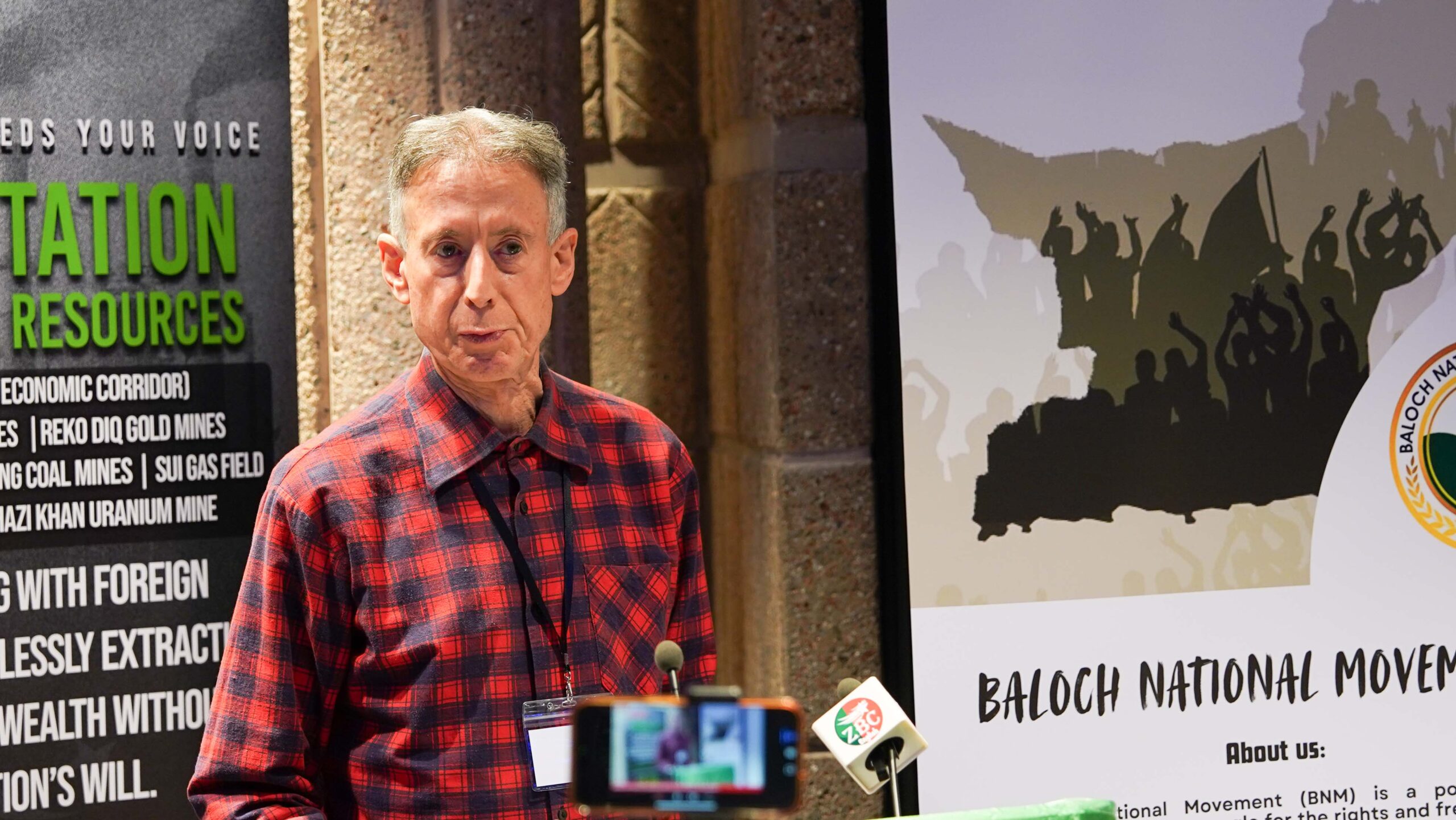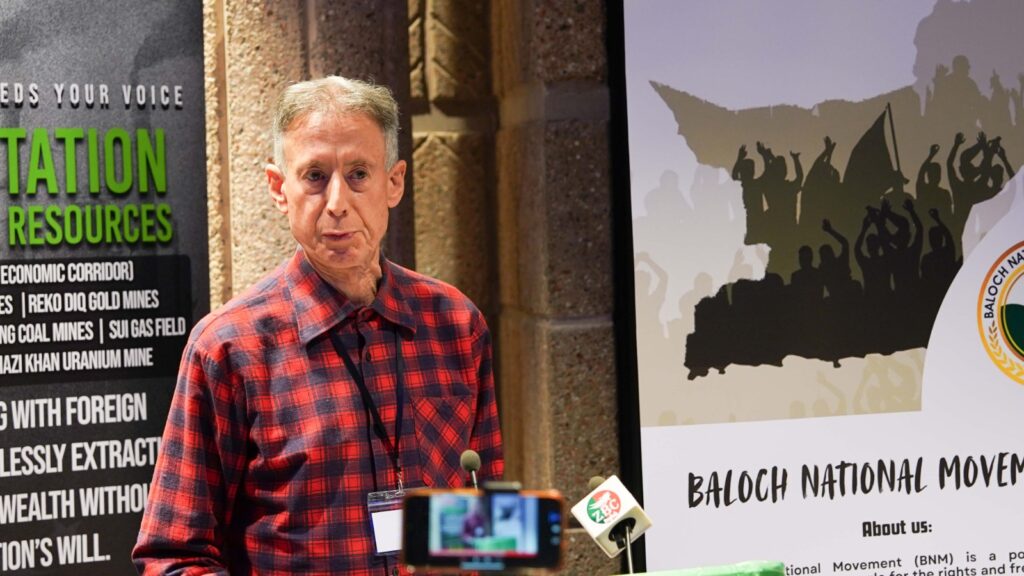in occupied Balochistan by the Pakistan , state and its military. I want to address the specific issue of how do we get from where Balochistan is today to where we want it to be in the future. In other words, how do we progress not just an end to the human rights abuses but also self-determination for the Baloch nation.
This is a huge, huge challenge. We all know the problem, what we must address is the solution. Now I speak as a friend and ally of the people of Balochistan going back many, many years but I am mindful that the future of Balochistan is a matter for the people of Balochistan and for the national movement of Balochistan.
It’s not up to me or any other outsiders to dictate solutions. All I can do is offer my experience and knowledge based upon nearly six decades of campaigning in support of liberation movements from Vietnam to East Timor to West Papua today. What I have are some ideas about how the people of Balochistan can move forward.
All I’m doing is offering ideas for consideration. They are suggestions not prescriptions. It is you, the people of Balochistan, who must decide.
What I am saying today is a result of lengthy discussions I’ve had over many years with Baloch activists. The common theme that they all say is we don’t have a path to peace and self-determination. We know our aspiration is in that direction but we don’t have a practical path to enable it to happen.
Now there are many laudable different aims from different sectors of the Balochistan National Democratic Movement and that comprises of course many different organizations, not just the Baloch National Movement (BNM) but many others as well. The problem is there isn’t, in my perception and the perception of many Baloch activists, any coherent practical path for a plan of action that will lead to peace, to end the occupation and to secure a negotiated political outcome. In my view and the view of the activists I’ve spoken with, there is a common agreement that the Baloch movement needs to put Pakistan on the spot by proposing a credible plan of action.
This is what we want. It’s how we’re going to get from here to there. The international community also wants to see a plan.
If they’re going to support your struggle, they need to know what your plan is, what you want, how you propose to get there. They want to know what you stand for and what you propose to achieve a solution. Many of you will be familiar with the draft Balochistan Freedom Charter.
The draft Balochistan Freedom Charter which was first proposed here in Geneva in 2010 by a coalition of Baloch activists. It is a roadmap to de-escalate the conflict and lead to national liberation and the creation of a new independent state. It proposes a six-stage process for peace and self-determination.
I want to outline them each briefly. Very importantly, it draws on the ideas, the principles, the policies that were used in the Vietnam peace protest in the 1970s to end the US-Vietnam war. The first principle is a UN-supervised ceasefire, the cessation of military operations by all sides, which means the confinement of Pakistani military forces to barracks and Baloch national insurgents to guerrilla camps.
That’s going to be the starting point, a de-escalation and end to the fight, a negotiated agreement. The second principle is the release of all political prisoners and all disappeared persons, a full account of those who are no longer alive, and that is incumbent on the Pakistan state. The third principle is open access to all parts of Balochistan for media, aid agencies, and human rights organizations to show what has been happening in Balochistan.
And as you know, right now, Balochistan is effectively closed to journalists, international journalists, aid agencies, and human rights organizations. The fourth principle is the right of return of displaced persons, refugees who fled Balochistan. They must have the right to return, they must have the restitution of their land and property, and there must be full compensation by Pakistan for losses caused by its forces during the conflict.
The fifth principle is an end to inward colonization of Balochistan by non-Baloch settlers. What Pakistan is doing is deliberately encouraging inward colonization with the ultimate aim of outnumbering the indigenous Baloch people so that the population becomes non-Baloch and therefore can be used by the Pakistani state to pursue its objectives. And the sixth and final principle is there’s got to be a UN-supervised referendum on self-determination which offers the people of Balochistan the option of independence.
Now those are six core principles which could be the negotiating template for a peace plan. Of course, Pakistan is not going to resist. But if the people of Balochistan go with a peace plan, similar to these six principles, to international aid agencies, to the United Nations, to the European Union, to the United States, if they go to them with this plan, the world will know that you have a credible, practical, achievable solution.
And that’s what mobilized public support for the Vietnam peace plan in the 1970s. The Vietnamese had a plan. They put it to the world community.
The world community saw it as achievable and therefore the world community pushed the United States to agree a settlement. Now the Balochistan Freedom Charter also proposes six principles as the basis for an independent state of Balochistan. And this is incredibly important because the international community is not going to support your struggle unless it knows what you stand for, unless it knows what you would do if you had power, if you had control.
So the first principle is social justice, equality, and human rights for all Baloch people, based on the principles of the United Nations Universal Declaration of Human Rights, including, very importantly, equal rights for women. As we have heard before, Balochistan is a deeply patriarchal, tribal society, where women have not had an equal place historically. But this is your chance to turn that page and make it clear that when Balochistan is free and independent, women will have equal status in that society, which will strengthen international support for your movement.
The second principle is one of land reform, the right of every adult Baloch person to have a share in land ownership. As you know, right now there are huge disparities of wealth and income in Balochistan. There is a very, very disparate relationship between land and certainly very wealthy families and the wider ordinary Baloch population.
That has to change. There’s got to be equal access to land, land ownership by all the people of Balochistan. And allied to that, the third principle, which is a redistribution of wealth and power to all the people.
So a democratic parliament based on universal suffrage for every Baloch person, every adult Baloch person, and a fair share of Balochistan’s resources. So if you get back control of your resources, it can’t be taken by a handful of wealthy Baloch entrepreneurs or wealthy families. It has to be fairly shared among all the people of Balochistan.
The fourth principle is a secular state. A state where people of all faiths and no faith have equal legal status and where no religion is privileged in law, government, or public institution. So in complete contrast with Pakistan, where Islam is the state religion and governs so many aspects of Pakistan life.
The fifth principle is democratic and personal freedoms, including a commitment to free multi-party elections, the right to protest, freedom of speech, and the press as enshrined in international human rights law. To be sure that you stand for these fundamental principles agreed by the peoples of the world. That’s a very powerful emphasis for the global community to support your cause, knowing that’s what you stand for.
And sixth principle is a UN commission of inquiry into disappeared persons and the victims of detention without trial. Specific credible roadmap, a roadmap which the people of Balochistan together with the United Nations and the international community can press Pakistan to accept. You want your representatives to go to the EU, to the United Nations, to the US government, and so on with concrete plans and proposals.
Now some critics say that Balochistan can never win against its all-powerful, overbearing occupier, Pakistan. But from my knowledge of history, David can defeat Goliath as the US learned to its cost in Vietnam. The greatest, mightiest military superpower in history was brought to its knees and forced to negotiate a political settlement by a tiny little Asian country with a peasant army with a huge passion, but also with practical proposals to end the war.
So like all people everywhere, the people of Balochistan have a right to self-determination. It’s enshrined in the UN Charter. Use it, vocalize it.
Pakistan can delay Balochistan’s right to self-determination. It can put off independence, but at great financial, moral, political, and reputational cost. One thing is certain, the freedom of Balochistan cannot, must not, and will not be denied.



